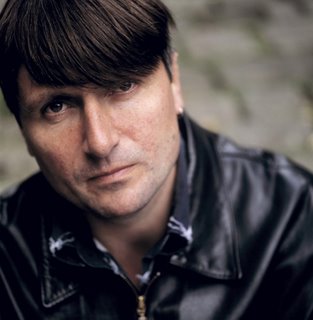 Simon Armitage, pictured here, has a new collection of poems out from Faber & Faber, with the intriguing title Tyrannosaurus Rex Versus the Corduroy Kid.
Simon Armitage, pictured here, has a new collection of poems out from Faber & Faber, with the intriguing title Tyrannosaurus Rex Versus the Corduroy Kid.Armitage is one of the most popular and widely-imitated poets among some of the better poets of my generation and those slightly younger; and is becoming an iconic figure of his generation, much as Auden or Hughes were, for theirs.
I have heard Armitage read several of the poems from it, firstly at Ledbury last year (where I read as well), and then again more recently at the launch of the Oxfam CD, Life Lines, where he kindly volunteered to read.
These new poems are some of his best, and also take him in a different direction - one similar, in tone and emphasis, to the lyrics on Thom Yorke's recent The Eraser. So I was somewhat surprised to read, in the Guardian, Robert Potts write that: "He still writes as well as anyone, in his particular vein. But the limits of his language really are the limits of his world; and there are some worrying signs here that those limits have indeed begun to contract."
What does Potts mean by "as well as anyone"? Armitage may be imitable to some degree, but has an original voice, for sure. He writes better than most, not just as well as his peers. Secondly, and more interestingly, what does Potts mean by "in his particular vein"? The vein is the main artery of contemporary British poetry, and should not be shrugged off.
Potts I think mainly favours another vein - the more modernist one represented by poets like J.H. Prynne - roughly speaking this is the experimental wing. I happen to find much of value in both wings - having what is sometimes called eclectic taste. Indeed, I write poetry that oscillates between clarity and playful ambiguity, between form and open form.
One of the unfortunate aspects of the current UK poetry scene is that outriders for both camps cannot find terms of agreement, or even of mutual recognition, and are locked in a battle of misreadings. But that's a bigger story, and one which is familiar in other countries too.
So, then, what does Potts mean by saying that Armitage's "limits of his language really are the limits of his world"? He is saying, I think, that Armitage's world, created and endorsed by his language, is not fully open - is, in effect, limited. In short, that Armitage's language is not open to going beyond its limits. Going beyond language's limits, for Wittgenstein or Habermas, is an act of deep philosophical and theological import. It may even be a strategy for some poets and writers (Joyce comes to mind as getting close; Beckett, closer).
The limit is normally known as silence - "whereof we cannot speak". Simon Armitage, like most poets, sees his proper function as working within language and its limits - and it is not entirely fair to blame the explorer for not sailing off the edge of the world, but finding it instead well-rounded.
What has Armitage done, in this collection, to suggest a shrinking of his world, his perspective, and his use of language? In these new poems, he has, instead, broached questions relating to class, politics, and the ill-judged actions of the Blair government in Iraq – hardly signs of diminution.
It is true that Simon Armitage writes a verse that is pleasing, performative, broadly popular, normally intelligible, well-crafted, and written to communicate ideas and feelings, in much the same way that a good song or short story might. The failing of his language, then, if it is a failing, a limitation, or shrinkage, can be said to be in scope or ambition; or it could be described as a moral decision – that is, a decision to write a certain way, for an audience of intelligent, “normal” adults.
What is fascinating about this decision, and I think it is fair to rather credit than blame Armitage for being aware enough of his faculties and talents to be in control of his poetic effects, is how much faith it puts in human nature and the mind. If anything, it could be argued that poetry’s presumption that, if you build it, people will come, is predicated falsely on the assumption that people still exist – that is “people” in the sense of decent, interested, concerned, humane persons that want to be moved by poems and think about the world through image, sound and sense.
Some poets express a deep pessimism about the nature of mass media, about the so-called reading public, about the idea of being popular, or “accessible” - because, from a certain vantage, the world where a poem can be valued, or validated, has long been destroyed by capitalism and our reification. In this world, poems are no longer shared messages between human beings, but angry, desperate and sometimes random acts perpetrated by isolated figures in a decentered universe without a god, or, indeed, a utopian horizon.
Armitage does not write for, or from, such a radically negative perspective regarding language; he continues to act as if words, roughly-speaking, signify, to most people, most of the time, things – emotions and thoughts, mostly, but also images that are somewhere in-between. This is a rich, deep vein, and, most importantly, it is one that carries blood, still, to the human heart.
note: photo is copyright Simon Armitage and taken from his site
Comments